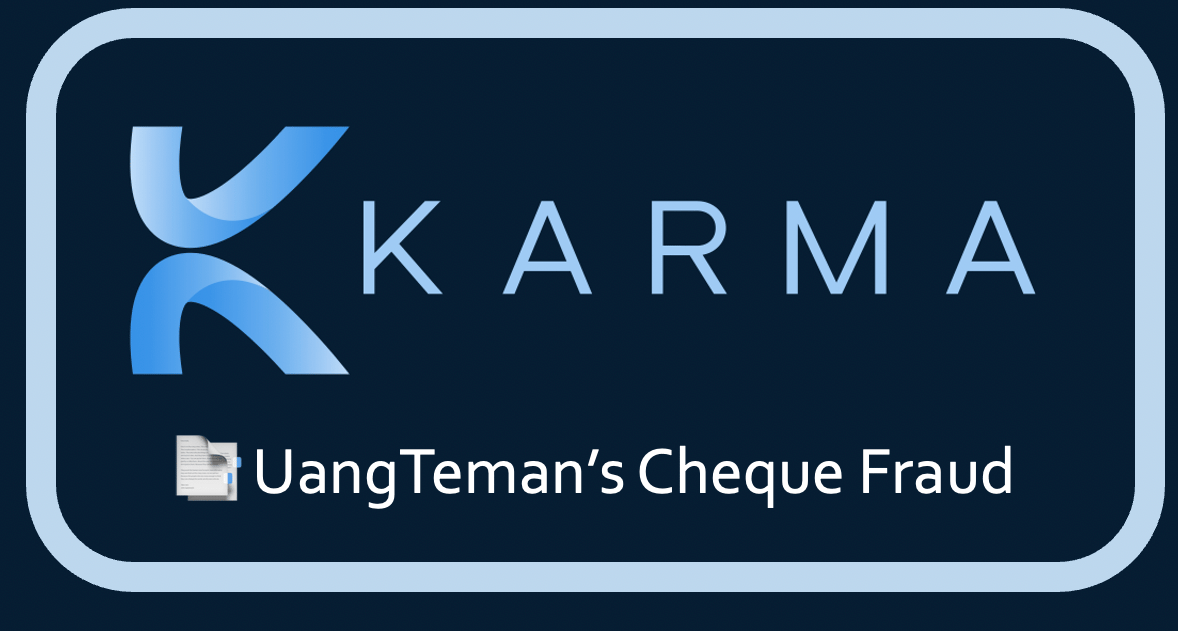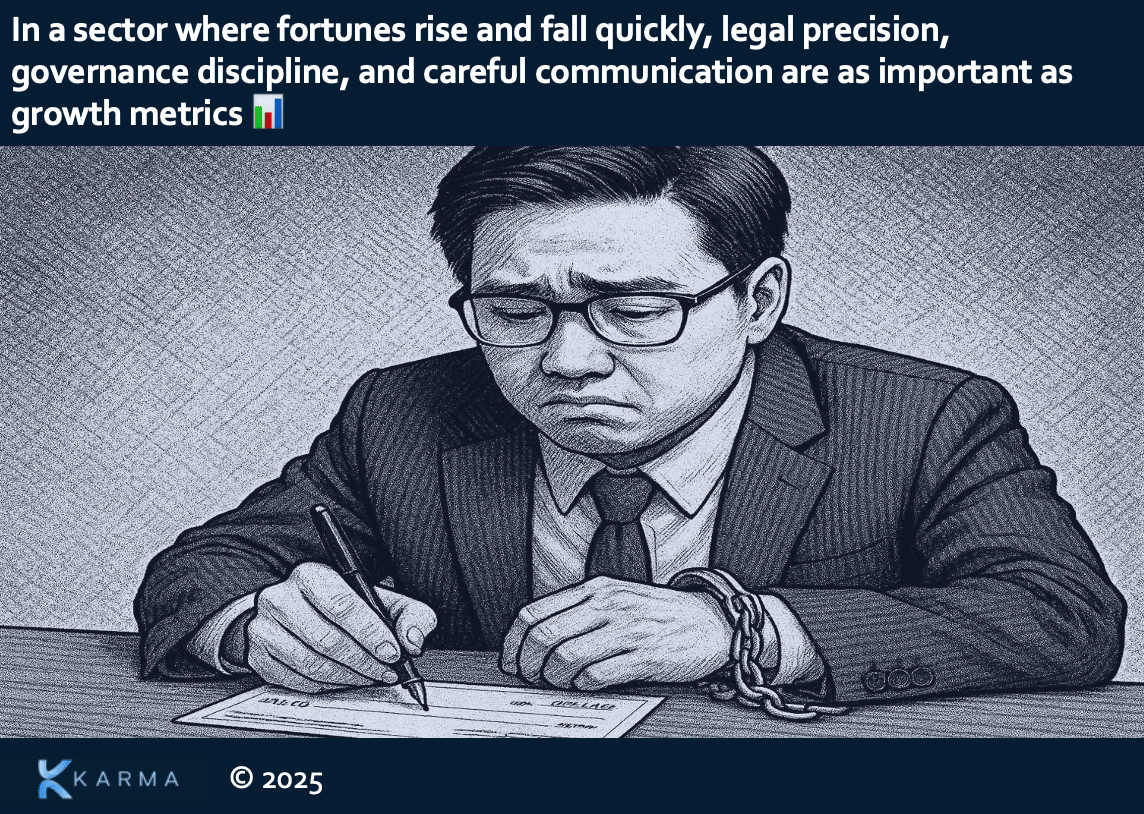- The Law of Karma
- Posts
- This Singaporean Tech Pioneer Went to Jail 🚔 over a $150,000 Cheque Dispute with His Own Board
This Singaporean Tech Pioneer Went to Jail 🚔 over a $150,000 Cheque Dispute with His Own Board
Year: 2024-2025 | Forum: Indonesian Criminal Court

Can a bounced cheque send a founder to jail?
💡 TL;DR
In the early days of Indonesia’s fintech lending boom, UangTeman emerged as a symbol of a new approach in Indonesia’s digital finance landscape 🚀. They promised quick cash in exchange for a high daily interest rate: courting controversy but also blazing a trail in an industry where regulations were still catching up.
Founded by Aidil Zulfikli, a Singaporean lawyer turned entrepreneur, UangTeman offered a product almost unheard of at the time: a one percent daily interest rate on small, short-term loans 💰.
Critics called it predatory. Supporters called it innovative. Either way, it was legal, largely because there were no specific rules governing such online lending products in 2015 and 2016.
📜 When OJK issued its first P2P lending regulation (Regulation No. 77 of 2016), UangTeman was among the first to apply
✅ By June 2017, it was officially registered
💰 Raised USD 12 million for Series A funding
💵 Secured USD 10 million for Series B funding
At its peak, UangTeman was regarded as a pioneer in Indonesia’s fintech lending sector.
That made what happened next all the more shocking.
In May 2024, Aidil was arrested on allegations of bank cheque fraud worth IDR 2.5 billion (around USD 150k) following a dispute with one of his own board members. By October 2024, he was found guilty. In March 2025, the Supreme Court upheld the conviction.
How did a financing arrangement between a CEO and his own board member end with a prison sentence? And what can other founders, investors, and directors learn from this story?
🌱 The Origins of the Dispute
The seeds of the conflict were planted long before UangTeman’s regulatory approval.
In November 2016, Aidil was seeking funds to expand the business. He found a willing backer in a coal businessman, let’s just call him DG. He then transferred IDR 2.5 billion to PT Digital Alpha Indonesia, UangTeman’s Indonesian operating entity.
The nature of this transfer remains murky in court records. Was it an equity investment? A loan to fund operations? Or debt financing to be deployed into the company’s lending activities?
Two details complicated the picture:
Aidil reportedly promised a 5% monthly interest rate, implying the funds might be used in UangTeman’s lending business. FYI, under a P2P lending structure, a platform like UangTeman connects lenders and borrowers, so DG could be considered a lender providing funds for short-term loans to borrowers vetted by UangTeman.
But, the money went into UangTeman’s operational entity account, suggesting it was for running the company, not for the loans.
At some point, DG was eventually also appointed as a commissioner (board member) of UangTeman, giving him oversight rights and access to internal information.
By 2019, the loan was transferred to a Singaporean entity, Digital Asset Management 1 Pte. Ltd. Court documents suggested that this restructuring took place after UangTeman’s financial struggles had started to emerge. The entity appeared to act as a “super-lender” in UangTeman’s P2P business.
In practice, under OJK regulations, a platform like UangTeman can only connect lenders and borrowers and cannot directly manage or pool funds (or “off balance sheet”). To work around this, some platforms establish offshore accounts to hold lenders’ money before disbursing it to vetted borrowers.
📉 Trouble Brews
The turning point came on 5 January 2021 📉. Aidil, acting on behalf of the Singapore entity, issued a letter of suspension of payment due to financial difficulties.
After months of unsuccessful collection efforts, DG received a cheque from Aidil in July 2021 for the full IDR 2.5 billion. But when DG tried to cash it, the account had insufficient funds.
Instead of treating this as a commercial dispute, DG reported Aidil to the police for alleged cheque fraud.
By 2024, after a protracted investigation, Aidil was arrested. The court also admitted evidence showing withdrawals from PT Digital Alpha Indonesia for what prosecutors claimed were personal uses. This became a critical factor in framing the case as fraud rather than a mere breach of contract.
🦠 The COVID-19 Collapse
While the criminal case centered on the 2016 transaction and the 2021 cheque, the company’s financial troubles had been mounting for years.
By late 2021, media reports revealed UangTeman had failed to pay salaries, taxes, and mandatory worker insurance 📑. Competition in the P2P lending space had exploded, with dozens of new players entering the market, making it harder for UangTeman to attract quality borrowers.
Aidil maintained that he had already repaid DG the majority of his earlier funding.
Aside from the disputed IDR 2.5 billion, there had apparently been two separate loan tranches of IDR 10 billion each, both carrying the same 5% monthly interest. These, he said, were fully repaid between 2016 and 2019 when the business was performing well. As for the IDR 2.5 billion, it could be argued that its nature was unclear: structured like a loan, yet arguably intended as operational equity.
He also insisted the July 2021 cheque was issued at DG request (as a board member) to secure a private commercial matter between them. In his view, this was a private contractual disagreement, not a criminal offense.
By 2022, OJK revoked UangTeman’s P2P license. The company sued OJK to reverse the decision but failed.
🤔 When Does a Cheque Become a Crime?
At the heart of the case was a legal question: can issuing a cheque that later bounces be treated as fraud? 🤔
For decades, Indonesian legal scholars have debated the fine line between criminal fraud and civil breach of contract in such cases.
The Supreme Court’s March 2025 decision examined whether Aidil had misrepresented facts from the very beginning to induce DG to provide the funds. If the falsehood existed at the time of the original agreement, it could qualify as fraud. If not, it would normally be a contractual dispute.
One citation often referred to is a 2018 precedent: a cheque could be considered fraudulent if the issuer knew from the outset that the account would never be funded. This is where UangTeman’s regulatory licensing became important.
📜 The Licensing Issue
The court then examined the licensing issue as part of its assessment of whether Aidil had intended from the very beginning to deceive DG. The court seems to suggest that the absence of a license both in 2016, when the funds were first provided, and in 2024, when the case was reported, as evidence that Aidil had intended from the very beginning to deceive DG.
However, what the judgment did not fully address:
UangTeman was in fact duly licensed by OJK from 2017 to 2022.
DG, as a board member, would have had access to information about the licensing process.
This omission matters because it raises the question of how much knowledge the alleged victim had about the company’s status 📜 and whether Aidil had intended to deceive the lender from the very beginning of the relationship.

📌 Why This Matters for Founders and Boards
For entrepreneurs in high-growth sectors, board disputes are usually managed in the boardroom, not the courtroom. When relationships sour, parties typically negotiate, restructure, or litigate in civil court. Criminal prosecution is rare.
This case is a reminder that in Indonesia, financial disputes can quickly turn criminal, especially if they involve bounced cheques, allegations of misrepresentation, or claims of personal fund misuse.
It also shows how regulatory status, even years after the fact, can be reframed in court to build a fraud narrative.
Key Lessons
Be cautious with cheques
In Indonesia, issuing a cheque that bounces can lead to criminal charges. Only issue cheques when you are certain the account will be funded.
Document the nature of funding clearly
Is it equity, a shareholder loan, lending capital, or operational funding? Clarity can prevent legal risk later.
Manage board relationships proactively
Board disputes can become personal, and personal disputes can turn criminal. Mediation and clear dispute resolution clauses help avoid escalation.
Separate personal and company funds
Withdrawals from company accounts that appear personal can be powerful evidence for prosecutors. Keep a clear paper trail 📂.
The story of UangTeman and Aidil Zulfikli is a warning for Indonesia’s tech founders. Success in the market does not shield you from boardroom fallout. In a sector where fortunes rise and fall quickly, legal precision, governance discipline, and careful communication are as important as growth metrics 📊.
For investors and directors, it is also a reminder. Once trust breaks down, even insiders can become adversaries, and in Indonesia’s legal environment, that can mean the difference between a bad quarter and a prison sentence.
Source:
South Jakarta District Court Decision 613/Pid.B/2024/PN Jkt.Sel
Supreme Court Decision Nomor 499 K/Pid/2025 =
Supreme Court Precedent Catalogue 5/Yur/Pid/2018
Reply